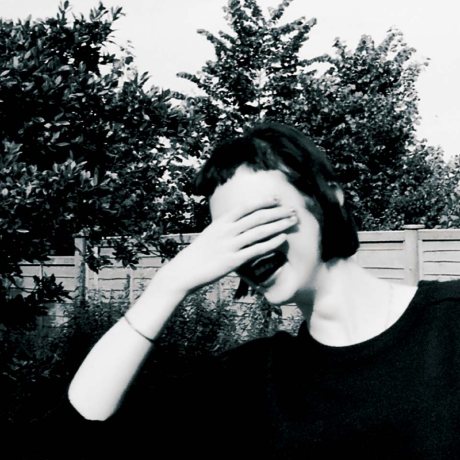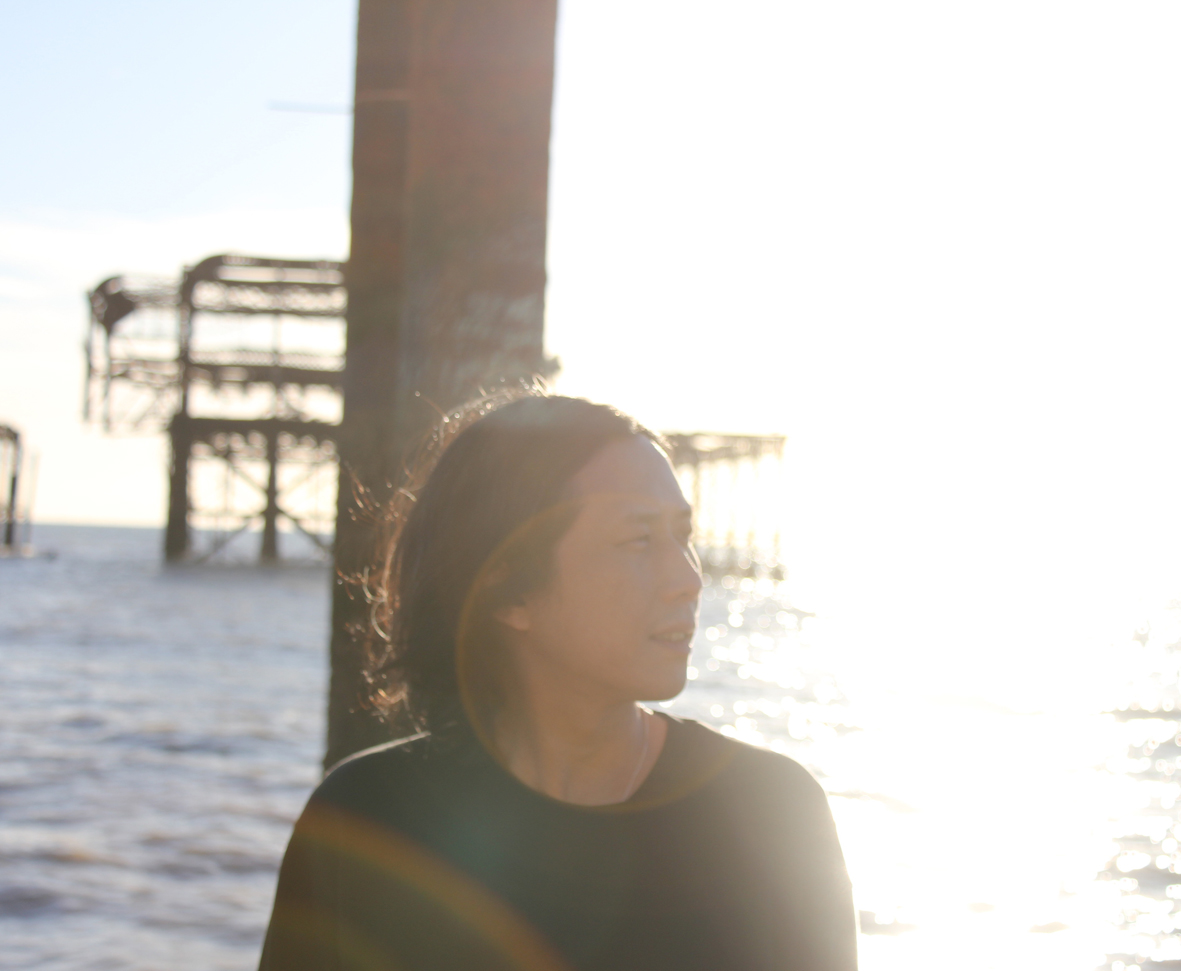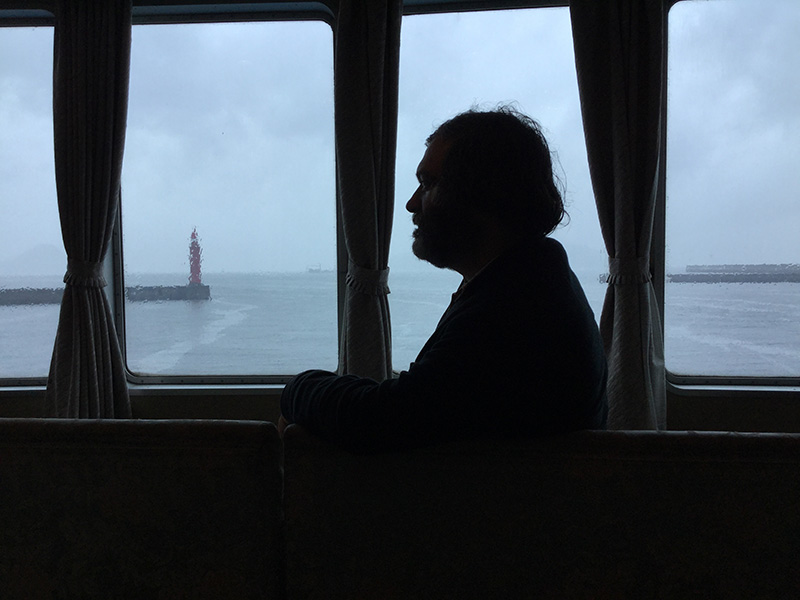 Grimm Grimm - Cliffhanger MAGNIPH / ホステス |
マイ・ブラッディ・ヴァレンタインの頭脳、ケヴィン・シールズが彼の元恋人シャルロット・マリオンヌ(ル・ヴォリューム・クールブ)とともに設立したレーベル〈Pickpocket〉からデビューを果たし、いまはなきインディー・ロックの祭典《All Tomorrow's Parties》には2度も出演、その〈ATP〉レーベルからも音源をリリースしたことのある日本人がいるのをご存じだろうか。ある種の人にとっては、嫉妬すら覚えるような輝かしい経歴を持つ彼は、東京出身・ロンドン在住のマルチ・インストゥルメンタリスト、Grimm Grimmことコウイチ・ヤマノハ。彼の通算2枚目のアルバム『Cliffhanger』がリリースされた。
前作『Hazy Eyes Maybe』よりおよそ2年半ぶりとなる本作は、ウィリアム・S・バロウズのカットアップ技法を彷彿とさせる散文詩や、いまにも消え入りそうなウィスパー・ヴォイス、童謡やバロックなどにも通じるどこか懐かしいメロディ、アコギやピアノによるシンプルなトラックによって構成された、フォーキーでサイケデリックなサウンド。前作に引き続き、盟友BO NINGENのKohei Matsudaが参加しシンセを奏でている他、様々なライヴやイベントで共演を重ねているシャルロットや、エクスペリメンタル・バンド、ブルー・オン・ブルーのディー・サダもヴォーカリストとしてフィーチャーするなど、前作よりもさらに深みのある内容に仕上がっている。
ロンドンに移住してすぐ、スクリーミング・ティー・パーティーなるバンドを結成し、その後ソロでの活動を始めたヤマノハ。彼の生み出す、どこの国のどの時代の音ともいえないサウンドは、一体どこから来ているのだろうか。
ときどき、「人と人は、深いところでは繋がっているな」と思うことがあるんです。「無意識の領域」というか、そこにはポジティヴでもなくネガティヴでもない、ニュートラルな感情がある。
■まずは、ヤマノハさんがイギリスへ移住した理由を教えてもらえますか?
コウイチ・ヤマノハ(以下ヤマノハ):特に理由はありませんでした。イギリスの音楽が好きだったというワケでもなくて、ただちょっと日本が窮屈だなと思うことはあったんですけど、でもそれも理由でもないから「何となく」っていう感じですかね。ただ、こっちでは音楽はやろうと思っていました。
■かれこれ10年以上、暮らしているんですよね。こんなに長く住むと思っていました?
ヤマノハ:いや、思ってなかったですね。2年くらいしたら住む場所を変えるつもりだったのに、気づけばこんなに経ってしまいました(笑)。ロンドンって、やっぱりちょっとイギリスじゃない感じがあって。コスモポリタンというか、多国籍空間で、変人も多いですし(笑)。何年いても不思議で。ここ10年くらいでテレーサ・メイみたいな右翼政府に変わってきているっていうのもあって、いまだに自分はエイリアンだなと感じます。そういうところは東京と似ているのかもしれないけど、ロンドンの方が僕にとっては居心地が良かったんですよね。
■ロンドンで最初に結成したバンド、スクリーミング・ティー・パーティーは、どうやって始まったのですか?
ヤマノハ:ロンドンに着いて、割とすぐにドラマーとベーシストを探していたんです。街のあちこちの壁や電柱にメンバー募集の紙を貼ったりして。で、たまたま通りかかったスタジオの前に女の子がいて、ドラムケースの上に座ってたんですよ。「彼女、ひょっとしてドラマーかな?」と思いつつ一度は通り過ぎたんですけど、戻って声をかけたらやっぱりドラマーで(笑)。たったいま、ドラマーをクビになって、ドラムセットを家に持ち帰るところだって言うんですね。それで、その場で仲良くなったのが最初のドラマー、イタリア人のテレーサ・コラモナコだったんです。もうひとり、日本にいるときからの友人ニイヤンがロンドンに来て。彼はギタリストだったので、僕がベースをやることにして3人でスタジオに入ったのが、スクリーミング・ティー・パーティーの始まりですね。
■バンドは2006年から2010年まで活動し、その間メンバーチェンジもありつつ3枚のシングル(「Between Air and Air」「Holy Disaster」「I'd Rather Be Stuck On The Stair Rail」)と2枚のミニ・アルバム(『Death Egg』『Golden Blue』)をリリースしています。バンド解散後は、ヤマノハさんはすぐソロ活動を始めたのですか?
ヤマノハ:いや、そこから3年くらい空きました。その間はずっと作曲やフィールド・レコーディングにハマっていて、ヨーロッパの古い建物や廃墟へよく行ってましたね。で、あるときベルリン西部にある廃墟でふとGrimm Grimmのコンセプトを思いついたんです。その頃はすでに曲を書きためていて、それをどういう形にするかを思いついた。言葉で言うのは難しいんですけど……うーん、懐かしい感じ? 死ぬときや、生まれる時の感じというか。ときどき、「人と人は、深いところでは繋がっているな」と思うことがあるんです。「無意識の領域」というか、そこにはポジティヴでもなくネガティヴでもない、ニュートラルな感情がある。基本的に僕は、ハッピーな音楽を作りたいと思う人間なのですが(笑)、そういう「無意識の領域」を想起させるような音楽が作りたいんですよね。
■確かに、Grimm Grimmの音楽を聴いていると「懐かしさ」みたいな感情をかき立てられるのですが、それって日本人だからこそ感じるものなのでしょうか。イギリスの人には、ヤマノハさんの音楽はどう受け止められていますか?
ヤマノハ:「懐かしさ」といっても、いわゆる「ノスタルジー」とは少し違うと思っていて。さっきの「生と死」じゃないですけど、過去と未来が繋がっているような感じというか。そこを目指しているんですが、海外でも伝わる人には伝わっているなと感じますね。
■いまっぽい音でも、昔懐かしい音でもなく、どこの時代の音楽かも分からないような、そういうサウンドを目指しているのでしょうかね。
ヤマノハ:そうですね。いまある音楽を否定したり、無視したりするつもりは全然ないのですが、時代感のない、タイムレスなメロディやサウンドに個人的には惹かれます。今回ミックスをしてくれたベルリン在住のミュージシャン、エンジニアのゴー君(Nakada Goh;ケヴィン・マーティンのThe Bugのサウンド・エンジニア)は古い友人で、ミックスをする時は1曲ごとに、例えば「視聴覚室で吹奏楽部が練習しているのが遠くから聞こえる学校感」とか「海辺の病院」とか、アンビエントの雰囲気や想像の場所を伝えてサウンドを決めていきました。

歩いていたら、ケヴィン(・シールズ)がいつもお金をあげてるホームレスたちが目的地のケバブ屋までついてきちゃった、ということがありました(笑)。一度に20ポンド(2800円)くらい平気であげちゃうから、みんな顔を覚えてるんですよ。
■そもそも、曲作りをする上でヤマノハさんが影響を受けた人というと、誰になるのですか?
ヤマノハ:ここ5年くらいは、未来派の絵画などに刺激をもらっていると思うんですけど、音楽でいうと誰なんだろう。うーん、わかんないですね。ムーンドッグとかはいまでもよく聴いてます。あとはヴァシティ・バニアンとかの曲にあるメロディの永遠性に惹かれます。サイケフォークとか、そういうステレオタイプの定義ではなくて、なんというかどんなジャンルの音楽やコメディや建物や椅子でさえも、生死感が根底にうっすらあるものに影響を受けます。
■童謡や、バロック音楽の影響もあるような気がします。
ヤマノハ:グレン・グールドが弾く、オルガンのバッハとかは昔から好きですね。あの「建築感」というか。それこそ過去と現在と未来が繋がっているような気がしますね。
■2014年の夏には〈Pickpocket Records〉(マイ・ブラッディ・ヴァレンタインのケヴィン・シールズと、ル・ヴォリューム・クールブのシャルロット・マリオンヌが共同設立したレーベル)からシングルをリリースしていますよね。彼らとの出会いは?
ヤマノハ:元々僕は、シャルロットがやっているル・ヴォリューム・クールブが好きだったんですね。ロンドンに着いて、初めて友人に借りたCDが彼女のファーストで。「ベスト・フレンドを殺した」というタイトルの作品でした。それから7年ほど経ったとき、偶然入った近所の中古レコード屋で彼女が店員をしていて。それで話しかけたのがきっかけとなって仲良くなったんです。ケヴィンは、シャルロットに紹介されて知り合いました。みんな、イメージと違ってとても気さくな人たちです。
■もうすぐMBVの活動が再開されますが、最近ケヴィンには会いました?
ヤマノハ:ひと月くらい前に、ダイナソーJr.がロンドンでライヴをやって、もともとJとケヴィンは兄弟みたいに仲が良くて、そのときに誘ってくれました。終演後、シャルロットも含めみんなでご飯を食べに行くことになって。カムデン・タウンを歩いていたら、ケヴィンがいつもお金をあげてるホームレスたちが目的地のケバブ屋までついてきちゃった、ということがありました(笑)。一度に20ポンド(2800円)くらい平気であげちゃうから、みんな顔を覚えてるんですよ。あ、ミュージシャンやってるケヴィンだ! って。
■ケヴィンらしいエピソードですね(笑)。Grimm Grimmは、2015年と2016年の《All Tomorrow's Parties Iceland》にも出演していますよね。
ヤマノハ:はい。バリー・ホーガン(ATP主催者)は、たまたま飲みに行ったバーのカウンターで隣どうしになって。話してみたら、友人の友人だったりして、結構見えないところにある横のつながりに気づいたりしますね。ATPは問題児の集まりみたいな(笑)。子供がそのまま大人になったみたいな人たちばかりで、そういうところが好きでしたね。もちろん、ビジネスなんだけど、それを超えたところでやっているというか。そういう人たちは、会った瞬間に分かりますね。「この人とは仲良くなれそうだな」っていうのは、シャルロットにもケヴィンにもバリーにも、〈Stolen Recordings〉(スクリーミング・ティー・パーティーが所属していたレーベル)の人たちにも感じました。
■Grimm Grimmとル・ヴォリューム・クールブは、よく一緒にイベントをやっているみたいですね。
ヤマノハ:ええ。ここ数年でシャルロットとは親友になって、ル・ヴォリューム・クールブ VS Grimm Grimmというユニットでお互いの曲を演奏しあうプロジェクトもしています。彼女は交友関係が広くて、特に90年代のいろんなミュージシャンと繋がることができました。10代のときに聴いていたマジー・スターのホープ・サンドヴァルや、ジーザス・アンド・メリーチェインの人たちとか。アラン・マッギー。刺激を受けることもたくさんあります。
■彼女はいま、ノエル・ギャラガーと一緒にツアー回っているんですよね?
ヤマノハ:そう! あれは本当にビックリしましたね(笑)。ノエルのプロデューサー、デヴィッド・ホルムズがシャルロットの友人でもあり、それが縁で参加することになったみたいです。彼女は特に楽器が上手いわけでもなくて、主にコーラスとして参加することになったんですね。でも、「何かしら弾けた方がいいよね」っていう話になって、僕のところに相談に来たんです。「どうしよう?」って。それで、「ハサミの音で参加するのはどう?」って提案したんですよ。
■(笑)。
ヤマノハ:僕は、ハサミの音が前からすごく好きだったので、パーカッション代わりに使ったらどうだろう? と思って。最初シャルロットは「ええ? ハサミ?」っていうリアクションだったけど、結局ライヴでやることになって。そしたら映像としてもハサミと女の人で、黒いオカルトっぽくてインパクトあるじゃないですか(笑)。一気に話題になって。ジュールズ・ホランドに出演したのが大きかったのかな(https://www.youtube.com/watch?v=iwV1lKNA0wU)。あれで炎上しちゃったんですよね。
■リアム・ギャラガーも苛ついてましたよね(笑)。
ヤマノハ:いろいろと大変だったみたいですよ。オアシスのフーリガンみたいなファンから脅迫メールが来たりして。「ちゃんと楽器を弾きやがれ!」とか。ちょっと変わった子っぽく映っちゃったからか、風貌を中傷するような書き込みとかもあって。彼女自身は全く気にしてなくて、いまの状況を楽しんでますけどね。
[[SplitPage]]自分を含め周りにいる人たちの人生は、崖にぶら下がっているみたいだなって思ったところからですね(笑)。あと、崖からぶら下がっているような、クライマックスのいちばんいいところで「来週に続く」みたいに終わることを「cliffhanger」というらしくて。
 Grimm Grimm - Cliffhanger MAGNIPH / ホステス |
■それを聞いて安心しました。さて、Grimm Grimmの最新作『Cliffhanger』ですが、こちらはどのようにして生み出されたのですか?
ヤマノハ:アルバムは、この2、3年いろんなことがあったのとリンクしている部分はある気がします。親しかった友人が亡くなったり、生死をいままで以上に身近に感じました。それについて書いた曲がタイトル曲なのですが、そこからアルバムの構想が膨らんでいきました。それと今回は「いままでで以上に正直に作ろう」と思いました。前作よりも、 自分のいちばん弱い部分が剥き出しになって、結果的に張り詰めた雰囲気が出たというか。音数もだいぶ少なくなっているんですけど、「引き算」で音楽を作っていくのが楽しかったですね。
■アルバム・タイトルはどこから来ていますか?
ヤマノハ:さっきの話じゃないですが、自分を含め周りにいる人たちの人生は、崖にぶら下がっているみたいだなって思ったところからですね(笑)。まあ、半分ジョークですが。あと、海外では映画のシリーズものとかで、崖からぶら下がっているような、クライマックスのいちばんいいところで「来週に続く」みたいに終わることを「cliffhanger」というらしくて。60年代に生まれた言葉で、それとかかっているのも面白いなと思いました。
■ヤマノハさんは崖からぶら下がっているような人生ですか?(笑)
ヤマノハ:(笑)。きっと多かれ少なかれ、みんなそう感じるときはあるんじゃないかなと思います。もがいたり足掻いたりしながら誰もが生きていると思うし。「苦難があってこその人生」という風に、ポジティヴに受け止めて生きた方がいいんじゃないですかね。例えば、人生において不安はつきものだと思うんですけど、僕は「不安」はいいことだと思っていて。それを乗り越える力があれば、それこそ幸せだなと思うんです。
■心強い言葉です。ちなみにタイトル曲は、ディー・サダという女性ヴォーカルをフィーチャーしています。
ヤマノハ:その曲は、いろいろとアレンジを試しながら何度かレコーディングしてみたんですが、なんか上手くいかなくて。ディーにヴォーカルをお願いして、歌とアコギだけのアレンジにしたらいい感じになったんです。彼女はブルー・オン・ブルーという、ロンドンのエクスペリメンタル・バンドに所属するネパール系女性ミュージシャンです。友人でもあるのですが、彼女の声が僕はすごく好きなんですよね。
■ほんと、ジュディ・シルの未発表曲みたいな美しさがありますよね。
ヤマノハ:嬉しいです。このメロディが、頭のなかでずっと繰り返し流れていて、それを携帯のボイスメモに録っておいて後から歌詞を付けました。難しかったのは、普通にアレンジしたらポップになり過ぎてしまう曲だったこと。自分のなかにも、そういう邪念というか(笑)、「サビでもっと盛り上げて……」みたいなポップスの定石を、ついつい踏襲したくなる。悪魔のささやきですね。でも、何度か試しているうちに「あ、これ全部要らないや」と気づき、それでナイロン・ギターと歌だけにしたんです。
■来日したとき、ライヴでも披露していた“Final World War”は、スクリーミング・ティー・パーティー時代にリリースした曲なんですよね?
ヤマノハ:この曲は、演奏しているうちに自分のなかで意味が変わってきたというか。最初に作ったときは「世界が滅亡して、それでもまだ流れている音楽」というイメージだったんですね。あるいは「事故で大破した車のカーステから流れている音楽」というか。ほんと、タイトル通り「世界最終戦争」という感じだったんですけど、いまは演奏していると、「最後の戦争が終わって、平和な世界が訪れるように生きる」というポジティヴな光景が目に浮かんでくるようになった。なので今回は、その解釈でレコーディングしたいなと思ったんです。

廃墟というとネガティヴな印象を持つ人もいると思うんですけど、僕のなかではポジティヴなイメージ。朽ちたままそこに存在している姿に、恋してしまったようなドキドキする感情を掻き立てられるんですよね。
■そういう、ヤマノハさんの気持ちの変化はなぜ訪れたんでしょう。
ヤマノハ:特に何か、大きなキッカケがあったわけじゃないんですけどね。生きていく上で、ポジティヴに考えなければどうしようもないときってあるじゃないですか。新聞でやりきれない悲しいニュースとか読んだりしていて、そう感じることが多くなってきたのかもしれないですね。ただ、いまだにあの曲をやり続けている意味は、自分でもよく分からないんですよね(笑)。まあ、気に入ってる曲なんだと思います。演奏していて、気持ちがニュートラルになるというか。
■もう1曲、スクリーミング・ティー・パーティー時代の“Shayou”も収録されています。これって、太宰治の『斜陽』と関係あります?
ヤマノハ:よく言われるんですけど、恥ずかしながらその本のこと知らなかったんですよ(笑)。最近まで読んだことがなかったんですけど、日本人の友人が帰国するときに本をたくさんくれて、そのなかに『斜陽』もあって読みました。ただこの曲は、ブダペストの工業地帯にある廃墟へ行ったとき、朽ちた建物の隙間から太陽光線がバーっと降っていて、その光景を見たときに思いついたものです。
■お話を聞いていると、ヤマノハさんにとって「廃墟」はインスピレーションの源ようですよね?
ヤマノハ:そうかもしれない。廃墟というとネガティヴな印象を持つ人もいると思うんですけど、僕のなかではポジティヴなイメージ。朽ちたままそこに存在している姿に、恋してしまったようなドキドキする感情を掻き立てられるんですよね。ロンドン東部にカナリー・ワーフという、ウォーターフロント再開発地域があるんですけど、妙な未来感があってそこを歩いていていてもなぜか同じ気分になります。巨大建築物ってなんか切なくて。
■ひとつとして同じ形のものはないですしね。人工的な建築物が、朽ちて自然と同化していく感じも好きです。
ヤマノハ:そう。他の惑星の生物のことを思ったりしますね。もっとわかりやすく言えば、廃墟は『天空の城ラピュタ』みたいな感じかな。
■“Shayou”のシンセは、Bo NingenのKohhei Matsudaさんが弾いているんですよね。
ヤマノハ:はい。隣の部屋に住む彼に来てもらって(笑)、同じシンセを2台並べて一緒に弾きました。試し録りをそのまま使っています。イメージとしては、「小学校の屋上」みたいな感じ……(笑)? なんか小学校の屋上って、なんとも言えない無機質で巨大な非日常感があったと思うんです。あまり頻繁には行かないし。晴れた空が広がる、永遠に終わらない真っ青な空間というか。言葉にならない異世界感というか。
■“Hybrid Moments”は、アメリカのホラー・パンク・バンド、ミスフィッツのアコースティック・カヴァーです。Grimm Grimmでは、カヴァーって他にもやりますか?
ヤマノハ:たまに。森田童子の歌や“ムーン・リヴァー”をやってます。そういえば森田さん、亡くなっちゃいましたね。日本に住んでいるときによく聴いている時期があって、童子好きが集まるイベントに出たことがあるんです。「森田童子の曲を演奏する」という内容だったのだけど、そのときに、ものすごく彼女に似ている声の人がいたんです。異様に張り詰めた雰囲気がある人で「あれは一体誰だったんだろう」って言い合っていたんですけど、どうやら本人だったらしく。
■ええ?
ヤマノハ:そうなんです。名前も変えて。で、みんなが気がついたときには、すでにいなくなってた。後日手紙が送られてきて、「いま、童子は横にいます」と書いてあった。超現実的で、白昼夢のような体験でした。
■不思議な体験ですね……。でも確かに、Grimm Grimmと森田童子のメロディには、どことなく通じるものがある気がします。前作『Hazy Eyes Maybe』に収録されていた“Kazega Fuitara Sayonara”とか。
ヤマノハ:あ、本当ですか。童子の歌って、飲み屋とかバーで流れたら、それまで賑やかだった場がしんと静まりかえってしまうような、空気を一変させる力がありますよね。そこが僕はとても好きです。歌詞の世界も、根本的というか。恋愛だけじゃない精神世界的な何かがあって。
■ところでヤマノハさんは、歌詞でどんなことを書きたいですか?
ヤマノハ:10代の頃って英詞の内容がわからないまま音楽聴いていて。いま思うと、英詩とかを日本語にするっていう翻訳の作業は、本当のところ繊細すぎてほとんど不可能みたいなことだと思うんです。その若干間違った歌詞翻訳を読んだりして、辻褄の合わない雰囲気、距離感に影響を受けました。僕は、歌詞の内容より音の響きや音質の方にプライオリティがあって。歌詞は散文詩じゃないですけど、1行ずつ考えていくので繋げたときに意味がなくなることも多いんですね。それでも、メロディと一緒に聴いたときに何かイメージが想起されればそれでいい。そういう歌詞の方が、聴き手のイメージが限定されず、いろいろと湧いてきたりすると思うんですよね。
■ウィリアム・S・バロウズのカットアップという技法に似ている部分があります。“Orange Coloured Everywhere”の、ナレーションみたいな声は?
ヤマノハ:タイトル曲でゲスト参加してくれたディーや、友人たちに喋ってもらいました。もともとこれは、デイジー・ディッキンソンという映像作家の『Blue But Pale Blue』という短編映画の作品のために作った曲なんです。
■シャルロットが参加している“Si”は、日本語の「死」という意味?
ヤマノハ:いえ、フランス語で「if」という意味です。シャルロットと会って、一緒に作った曲なんですが、僕がメロディを考え、彼女が歌詞を付けてくれました。
■今後はどんな活動展開を考えていますか?
ヤマノハ:7月にジュネーヴにあるCERN(セルン)という欧州合同原子核研究機関でライヴをする予定があります。スティーヴン・W・ホーキング博士が「ビッグバン・セオリー」を研究していた巨大なドームで、普段滅多に演奏できるところではないのですごく楽しみです。メンバーと一緒にドラムマシンやシンセを使って取り組んでいて。そこからインスピレーションを受けながらアルバムの準備をしています、いまはドラムマシンで曲を作っていますね。
■へえ、じゃあまた違った雰囲気の作品になるかもしれないですね。
ヤマノハ:最終的には、今作よりももっと削ぎ落としたものになるかもしれないですけど。逆にチェロやホーンを入れたり、いろんなことができたらいいなと思案中です。いずれにせよベーシックな作曲の部分は変わらないと思いますね。









